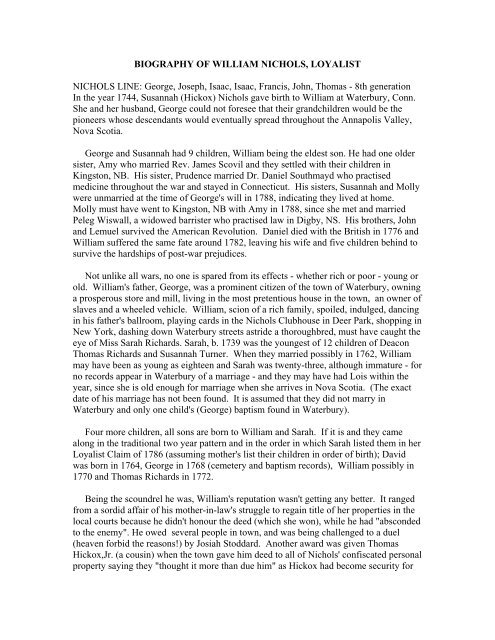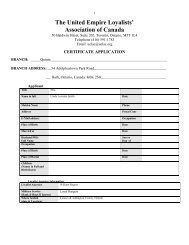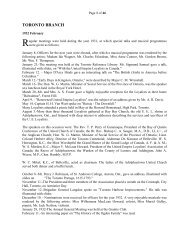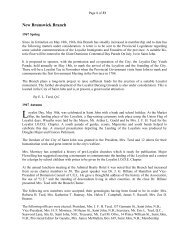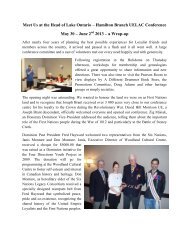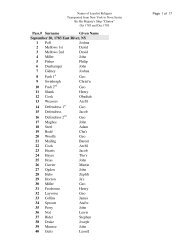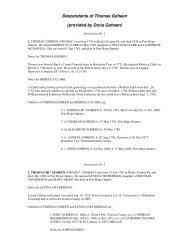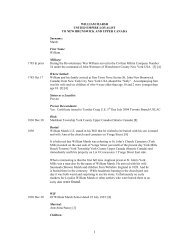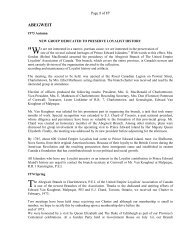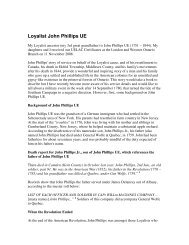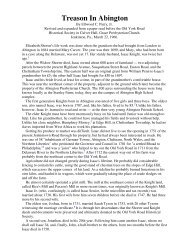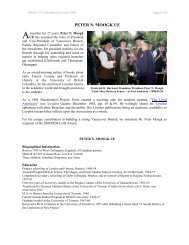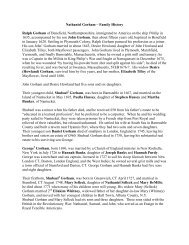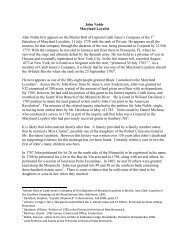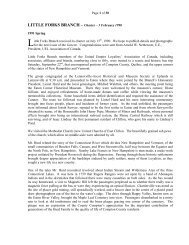BIOGRAPHY OF WILLIAM NICHOLS, LOYALIST NICHOLS LINE ...
BIOGRAPHY OF WILLIAM NICHOLS, LOYALIST NICHOLS LINE ...
BIOGRAPHY OF WILLIAM NICHOLS, LOYALIST NICHOLS LINE ...
Create successful ePaper yourself
Turn your PDF publications into a flip-book with our unique Google optimized e-Paper software.
<strong>BIOGRAPHY</strong> <strong>OF</strong> <strong>WILLIAM</strong> <strong>NICHOLS</strong>, <strong>LOYALIST</strong><br />
<strong>NICHOLS</strong> <strong>LINE</strong>: George, Joseph, Isaac, Isaac, Francis, John, Thomas - 8th generation<br />
In the year 1744, Susannah (Hickox) Nichols gave birth to William at Waterbury, Conn.<br />
She and her husband, George could not foresee that their grandchildren would be the<br />
pioneers whose descendants would eventually spread throughout the Annapolis Valley,<br />
Nova Scotia.<br />
George and Susannah had 9 children, William being the eldest son. He had one older<br />
sister, Amy who married Rev. James Scovil and they settled with their children in<br />
Kingston, NB. His sister, Prudence married Dr. Daniel Southmayd who practised<br />
medicine throughout the war and stayed in Connecticut. His sisters, Susannah and Molly<br />
were unmarried at the time of George's will in 1788, indicating they lived at home.<br />
Molly must have went to Kingston, NB with Amy in 1788, since she met and married<br />
Peleg Wiswall, a widowed barrister who practised law in Digby, NS. His brothers, John<br />
and Lemuel survived the American Revolution. Daniel died with the British in 1776 and<br />
William suffered the same fate around 1782, leaving his wife and five children behind to<br />
survive the hardships of post-war prejudices.<br />
Not unlike all wars, no one is spared from its effects - whether rich or poor - young or<br />
old. William's father, George, was a prominent citizen of the town of Waterbury, owning<br />
a prosperous store and mill, living in the most pretentious house in the town, an owner of<br />
slaves and a wheeled vehicle. William, scion of a rich family, spoiled, indulged, dancing<br />
in his father's ballroom, playing cards in the Nichols Clubhouse in Deer Park, shopping in<br />
New York, dashing down Waterbury streets astride a thoroughbred, must have caught the<br />
eye of Miss Sarah Richards. Sarah, b. 1739 was the youngest of 12 children of Deacon<br />
Thomas Richards and Susannah Turner. When they married possibly in 1762, William<br />
may have been as young as eighteen and Sarah was twenty-three, although immature - for<br />
no records appear in Waterbury of a marriage - and they may have had Lois within the<br />
year, since she is old enough for marriage when she arrives in Nova Scotia. (The exact<br />
date of his marriage has not been found. It is assumed that they did not marry in<br />
Waterbury and only one child's (George) baptism found in Waterbury).<br />
Four more children, all sons are born to William and Sarah. If it is and they came<br />
along in the traditional two year pattern and in the order in which Sarah listed them in her<br />
Loyalist Claim of 1786 (assuming mother's list their children in order of birth); David<br />
was born in 1764, George in 1768 (cemetery and baptism records), William possibly in<br />
1770 and Thomas Richards in 1772.<br />
Being the scoundrel he was, William's reputation wasn't getting any better. It ranged<br />
from a sordid affair of his mother-in-law's struggle to regain title of her properties in the<br />
local courts because he didn't honour the deed (which she won), while he had "absconded<br />
to the enemy". He owed several people in town, and was being challenged to a duel<br />
(heaven forbid the reasons!) by Josiah Stoddard. Another award was given Thomas<br />
Hickox,Jr. (a cousin) when the town gave him deed to all of Nichols' confiscated personal<br />
property saying they "thought it more than due him" as Hickox had become security for
William"s debts to New York merchants. Slaves were given their freedom for enlisting<br />
and William promised this to his own slave but meanwhile, had sold him to young<br />
Hickox. The poor slave's petition for freedom May 1785 thus was denied.<br />
With all his troubles at home, one can believe a commission in the Kings Army<br />
looked mighty attractive. In her claim of property, Sarah stated that William had been<br />
loyal to the British Government and joined the British Army on Long Island (Pookition,<br />
NY) in 1776, remaining within the British lines all the War. He was a recruiter for the<br />
British Army but as fate would have it, he, with others, were eventually seized and<br />
imprisoned.<br />
From "Loyalists of the American Revolution, p.646; AO12/1/44:<br />
Nichols, William of Connecticut. a native of New Haven, CT, when the Revolution<br />
began Nichols was living in Waterbury, CT. He had 110 acres there, much of it<br />
improved. Nichols travelled to New York in December 1776, joined the British Army on<br />
Long Island with forty other men, and remained there until his death in 1783. He left a<br />
widow named Sarah and five children - Lois, David, George, William and Thomas - all<br />
of whom later settled in Wilmot, NS. David, born in 1765, remained in CT during the<br />
war, but was later grarnted land in Nova Scotia; Sarah married Zechial Welton. William<br />
Nichols. Sr. was twice taken prisoner for recruiting for the British. He was attainted of<br />
treason, and had his property confiscated. Nichols' loss was estimated at 1,673 pounds,<br />
New York.<br />
Once dead, heroism opens like a summer blossom - and here is the story of the death<br />
of our colourful ancestor. "Tradition says while in service on the loyal side he was taken<br />
prisoner and treated with great severity. He was much feared and dreaded by the enemy,<br />
and being informed it was their design to put him to death on some pretext, he planned an<br />
escape. One stormy night he and his fellow prisoners seized and gagged the inner guard,<br />
secured his musket, overpowered all opposition, and escalading the outer wall of the<br />
prison, fled to the nearest forest, through which they pushed toward the Delaware River,<br />
which then formed the limit of the rebel lines. Finding no boat there, his companions<br />
shrank from the attempt to cross the river, swollen with recent rain and floating ice, as<br />
fraught with certain death. "My capture will be the signal of certain death to me", said<br />
he, determined not to be taken as he sprang in, and fighting his way among the ice-flows,<br />
succeeded in reaching the opposite shore. Although exhausted and nearly frozen, he<br />
eventually reached the British camp. However, this feat caused his death (said to be<br />
pneumonia) a few months later from the chill he received. He died in New York in<br />
1782."<br />
The War is over - Sarah is now a widow with five children - all under 21. I'll always<br />
wonder what made her decide to come to Nova Scotia with the thousands of other<br />
Loyalists who evacuated the colonies. Her father had died in 1760 and her mother if<br />
living would have been quite elderly and her in-laws were still living but elderly.<br />
William had owed many a person, also being a loyalist his estate was forfeited - leaving<br />
her little or nothing - although through her Loyalist claim from Wilmot, NS written<br />
Oct.13,1786, her losses were proved Jan.8,1787 and paid 616 pounds. Had she been
persecuted and threatened like the others? William had several dealings with Ezekiel<br />
Welton (who had been town clerk in Conn.) and also helped Sarah obtain embursement<br />
of property loss. He did eventually become her second husband after their arrival in<br />
Nova Scotia. Could he have possibly been an added attraction to her resettlement to Nova<br />
Scotia?<br />
In 1783, Sarah, her daughter Lois and 3 sons David, Thomas Richards and George<br />
arrived in Digby. Her son William, Jr. remained behind, old enough to manage his<br />
grandfather's extensive affairs and rewarded in his will of 1788, and assumed he never<br />
did venture to Nova Scotia. However, one record stated that in Wilmot 1792 George,<br />
William and Richard were over age 21. Also Sarah mentions in her Loyalist Claim<br />
(Oct.1786) that William would come to Nova Scotia the following spring. There is also a<br />
William listed among the co-owners of the iron mine and manufacturing that the family<br />
invested into, in Nictaux, N.S.<br />
In Digby, Sarah received a land grant in Feb 1784 for 250 acres. According to the<br />
record the grant became escheat - forfeited to the crown because the grantee had failed to<br />
fulfil the conditions specified in the grant (Brudenell's book writes - left town). The main<br />
condition at the time of the Loyalist migration was to 'improve' a certain portion of the<br />
grant by clearing, cultivation, draining of swamps, building a home, etc. within a 3 year<br />
period. Evidence show that she and her family, removed from Digby to the Township of<br />
Wilmot and also having married Ezekiel Welton, she could not possibly have honoured<br />
her grant. The lot of land in Digby was not far from where the present day museum<br />
stands.<br />
Ezekiel (1745-1830) came to Annapolis in 1783 and later was church warden of<br />
Trinity Church, Wilmot. He and Sarah never had any children although Ezekiel had 2<br />
sons and a daughter and eventually 23 grandchildren from his first marriage, all living in<br />
NS also. I have not been able to find a record of the marriage of Ezekiel and Sarah since<br />
it was before the churches were built and records kept. However, both are listed in the<br />
Register of Burials of the Trinity Church in Wilmot (now Middleton). Sarah d. August<br />
1813 at 74 years (Recorded "bur. Aug 1813 Mrs. Welton, Wilmot, ag 74") and Ezekiel<br />
Jan.3,1830 at 87 years. They must have been healthy, hard-working and strong-willed<br />
people to have coped with the hardships of resettling and building a new life and to have<br />
been able to die at a ripe old age.<br />
The following are the transactions of William Nichols which Dr.Barlow researched in<br />
Connecticut. It certainly gives one an idea of the type of character we are descended<br />
from:<br />
Records of the State of Connecticut 1778-1780<br />
Volume II, pages 64-65<br />
"Upon the memorial of Samuel Raynolds and John Nettleton, both of Waterbury in New<br />
Haven County, showing to this Assembly that Thomas Richards late of said Waterbury,<br />
deceased, by his last will and testament gave and bequeathed unto Susannah Richards, his
wife, in lieu of her dower in his estate, the use and improvement o f ten acres of plowland<br />
of the lot whereon his barn stood, the one half of his orchard and one half of a certain<br />
piece of meadow land in said will described, during her natural life, and to her and his<br />
daughter Sarah Richards jointly the use and improvement of the south room of his<br />
dwelling-house and the bedroom, one half of his cellar and the east part of his barn, so<br />
long as they should bear his name, as by an attested copy of said will may fully appear;<br />
that said Susannah Richards upon the decease of said Thomas accepted of and entered<br />
into possession of said premises in lieu of her dower in said estate; that by reason of her<br />
great age, infirmness and total blindness, she is become wholly unable to transact<br />
business and to support or provide for herself; that never the less some time in the year<br />
1777 she was induced by her son-in-law, William Nichols of said Waterbury, by a deed<br />
of assignment by her executed to assign, sell and make over to said Nichols her whole<br />
right and title in and unto said premises, viz; - the whole of that she was entitled to and by<br />
said will in lieu of her dower in the real estate of said deceased Thomas Richards; that<br />
said deed of assignment was given for no valuable consideration, but merely on<br />
consideration of said Nichols promises to maintain, provide for and support her, the said<br />
Susannah Richards; that said consideration hath wholly failed; that said Nichols before<br />
the making of said deed had absconded and joined the army of the King of Great Britain<br />
on Long Island, and at the time of making and executing said deed he was a prisoner<br />
upon bail, his whole estate was liable to forfeiture and actually attached for the use of the<br />
State & c; that the memorialist, said Raynolds, is the son and said Nettleton the son-inlaw<br />
of said Susannah Richards, and the only children of said Susannah Richards who are<br />
of sufficient ability to support and maintain her &c,; praying this Assembly to interpose<br />
in her behalf and to declare the aforesaid deed of assignment to said William Nichols null<br />
and void &c., as per memorial on file &c.: Resolved by this Assembly, that the said deed<br />
of assignment made and executed by the said Susannah Richards to the said William<br />
Nichols be and the same is hereby vacated and made null and void and of none effect."<br />
Abstracts of Deeds in the name of William Nichols of Waterbury:<br />
(Money is in pounds)<br />
1. Mar.3,1773 - Elnathan Judd and wife Miriam to William Nichols 13 1/2 acres which<br />
bounds Obadiah Richards (Sarah Richards Nichols' grandfather) for $60-15.<br />
2. Oct.26,1773 William sold above piece to Samuel Judd, Jr. $61-15<br />
3. May 31,1773 William sold 9 acres to Ezra Hull $11.<br />
4. Mar.27,1778 William sold 24A. to John Broom on Hog Pond Brook $33. William was<br />
in New Haven when he signed this deed.<br />
5. Mar.7,1774 William and George Nichols (his father) together sold to Joseph Nichols<br />
(cousin) and his father Richard Nichols served as witness $18.<br />
6. Mar.12,1778 Execution by Wm. Nichols levied against the estate of Dr. Ezekiel<br />
Welton of Waterbury to take 5 acres of 240 acre lot to pay debts of $4-18/6 and costs.
Execution approved Mar.12,1778 to settle a judgment won in court in New Haven on<br />
Tuesday, 2nd Nov. 1776. (And another similar suit for a small account. Still another suit<br />
won at court. Dr. Ezekiel Welton and the Nichols were well known to each other in<br />
Waterbury).<br />
7. Jonathan Felt won judgment against William Nichols - 1779.<br />
8. Feb.20,1775 Benjamin Richards, Jr. (Sarah's brother) to Wm. Nichols a farm in the<br />
parish of Westbury 100 acres and buildings which bounds Noah Richards and Abraham<br />
Richards (of Sarah's family). $650.<br />
9. Apr.1,1775 William sold Rev.James Scovil (sister's husband) two tracts on Long Hill,<br />
one of 24 acres with parsonage, the other 36 acres being "all the land I brought of Peter<br />
Golatt and Hugh Gains of the City of New York $182."<br />
10. Jan.26,1773 Dr. Ezekiel Welton of Farmington for (to Wm. Nichols) two pieces in<br />
the NE quarter of town 40 acres and a 24 acres. This is a mortgage to cover payment of<br />
Mar.1,1773 $65.<br />
11. Feb.20,1775 Wm. Nichols for $881-10-11 to Lewis McDonald of Bedford, New<br />
York, 100 acres same as 19-124, mortgage dated Feb.20,1771 to cover payment of full<br />
sum with interest by Feb.20,1778.<br />
From the Archives Revolutionary War, First Series, Index of Papers on William Nichols,<br />
State of Connecticut:<br />
1. Accused of obtaining assignment of mother-in-law's property through undue influence<br />
& absconding to the enemy. Waterbury estate confiscated 1777-78.<br />
2. Departure to the British & dept to Lewis McDonald estate unpaid, 1780.<br />
3. Petition of selectmen showing William Nichols joined the British and his estate is<br />
forfeited. Before leaving Thomas Hickox, Jr. (his cousin) became security for Nichols to<br />
New York merchants and in payment secured Nichols' personal estate which town<br />
considers more than due him. They ask reappointment of com. as that appointed by<br />
Assembly previously has never reported, Feb.1780.<br />
4. Attachment of William Nichols' personal property in favour of Thomas Hickox,Jr. to<br />
answer debt of &1,000 receipted by Hickox April 1779.<br />
5. Appointment of com. on petition, Jan. 1780.<br />
6. Com. of Wiliam Nichols and Thomas Hickox,Jr. in favour of John Broome, June 1778.<br />
7. Deposition of Pierpoint Edwards on amount collected on note due Nichols & that<br />
remaining notes are in his hand May 1780.
8. Com. Reappointed May 1790.<br />
9. Com. report they find bond forfeited & as the notes mentioned as security are in hands<br />
of Pierpoint Edwards they consider them as the estate of Nichols. Not accepted<br />
November 1780.<br />
10. County court return of confiscated estates.<br />
11. Waterbury, owner of negro Joseph Mun, whom he allowed to enlist with expectation<br />
of gaining freedom. Nichols joined the British but before going gave bill of sale of negro<br />
to Thomas Hickox,Jr. Mun's petition for freedom, Negative, May 1785.<br />
The children of William Nichols and Sarah Richards gave them 34 grandchildren that are<br />
recorded. Most all of which have descendants throughout Nova Scotia and some who<br />
migrated back to the United States.


